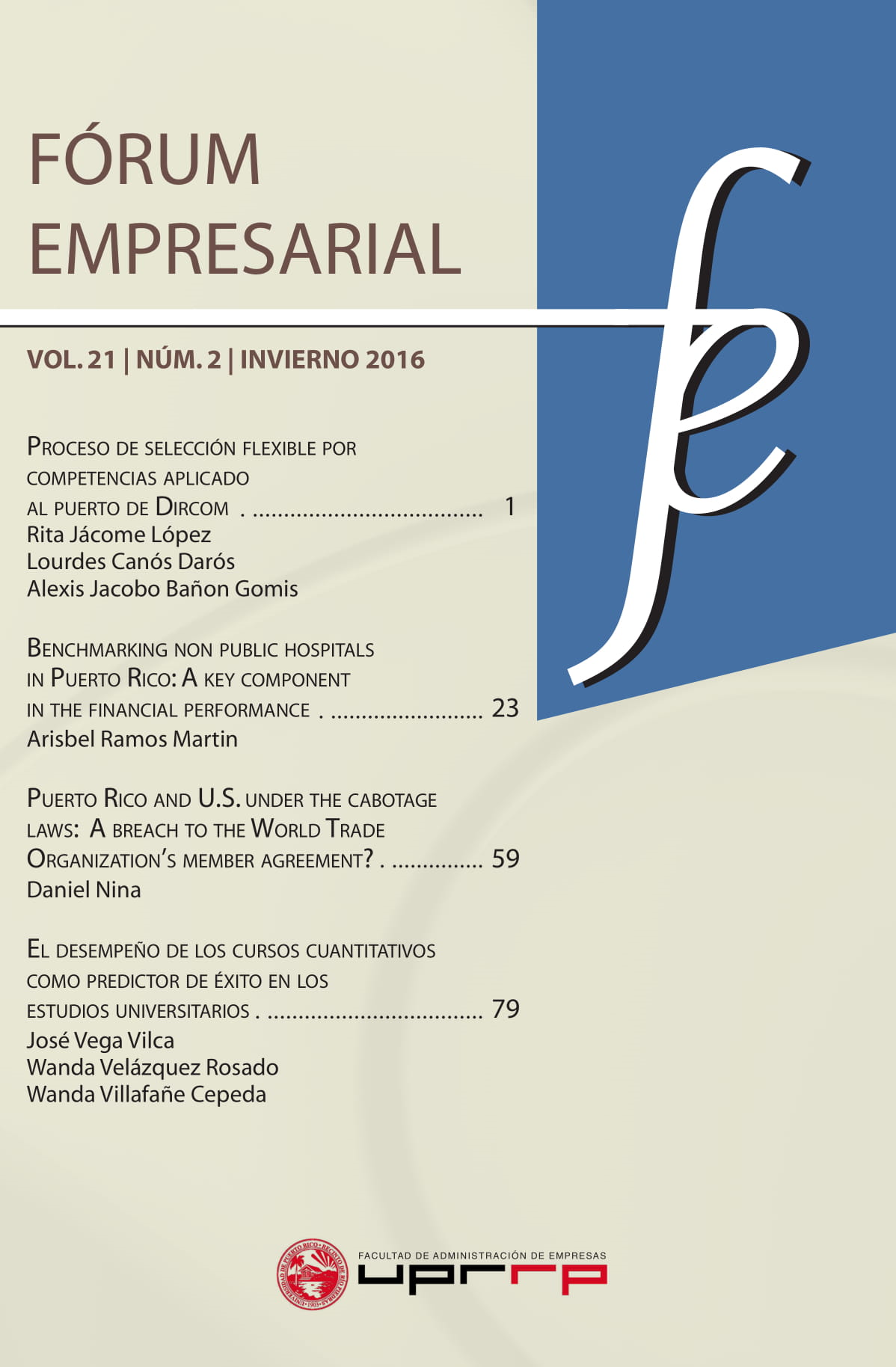Abstract
This study investigates the variables that can predict university success. A sample of 202 students who completed studies in December 2013 and May 2014 was used. The variables achievement and aptitude in mathematics, student gender, type of school, general index of application, quantitative courses index, grade point average, and study time were studied. The data were analyzed using the partial least squares path modeling and logistic regression analysis. The results revealed that the performance of students in the quantitative courses is a good predictor of success in their studies.References
Arias Ortiz, E., & Dehon, C. (2013). Roads to success in the Bel-gian French Community‘s higher education system: Predictors of dropout and degree completion at the Université Libre de Bruxelles. Research in Higher Education, 54,693-723. doi 10.1007/s11162-013-9290-y
Coronado Ramírez, S., Sandoval Bravo, S., & Torres Mata, A. (2012). Diferencias de género, factores que inciden en el rendimiento matemático de licenciaturas económico administrativas. Sinéctica, Revista Electrónica de Educación, 39. Recuperado de http://www.sinectica.iteso.mx/index.php?cur=39&art=39_11
Croft, A. C., Harrison, M. C., & Robinson, C. L. (2009). Recruitment and retention of students–an integrated and holistic vision of mathematics support. International Journal of Mathematical Education in Science and Technology, 40(1), 109-125. doi 10.1080/00207390802542395
DeNicco, J., Harrington, P, & Fogg, N. (2015). Factors of one-year college retention in a public state college system. Research of Higher Education Journal, 27, 1-13.
Goncalves, S. A., & Trunk, D. (2014). Obstacles to success for the nontraditional student in higher education. Psi Chi Journal of Psychological Research, 19 (4), 164-72.
Gordon, S. (2010, Oct). The states of mathematics education today: What happens in the math classroom. Journal of Economics and Finance, 34, 471-476.
Gupta, S., Harris, D. E., Carrier, N. M., & Caron, P. (2006). Pre-dictors of student success in entry-level undergraduate mathematics courses. College Student Journal, 40(1), 97-108.
Larrazolo, N., Backhoff, E., & Tirado, F. (2013). Habilidades de razonamiento matemático de estudiantes de educación media superior en México. Revista Mexicana de Investigación Educativa, 18, 1137-1163.
Laskey, M. C., & Hetzel, C. J. (2011). Investigating factors related to retention of at-risk college students. Learning Assistance Review, 16(1), 31-43.
Lesik, S. A. (2007). Do developmental mathematics programs have a causal impact on student retention? An application of dis-crete-time survival and regression-discontinuity analysis. Research in Higher Education, 48, 583-608. doi: 10.1007/s11162-006-9036-1
Martín E., García, L. A., Torbay, A., & Rodríguez, T. (2008). Estrategias de aprendizaje y rendimiento académico en estudiantes universitarios. International Journal of Psychology and Psychological Therapy, 8, 401-412.
Matos Díaz, H. (2008). Relaciones entre admisiones, calidad de los estudiantes, aprovechamiento académico e "inflación de c-lificaciones": Evidencia de la Universidad de Puerto Rico en Bayamón. Revista de Ciencias Sociales, 18, 78-103.
Parker, M. (2005). Placement, retention, and success: A longitudinal study of mathematics and retention. The Journal of General Education, 54(1), 22-40.
Sánchez, G. (2013). PLS path modeling with r. Berkeley, CA: Trowchez Editions. Recuperado de http://www.gastonsanchez.com/PLS_Path_Modeling_with_R.pdf
Vázquez Calle, F., & Cabrera Pérez, J. A. (2004). Algunos determinantes del éxito en completar el bachillerato: Estudio longitudinal de seis años. Cayey, PR: Universidad de Puerto Rico en Cayey. Recuperado de http://portalwww.cayey.upr.edu/main/sites/default/files/Algunos_determinantes_del_exito_en_completar_el_bachillerato_Estudio_Longitudinal_de_Seis_Anos.pdf
Vega Vilca, J. C., & Agosto, F. (2010). Predicción del aprovechamiento académico: Estudio de los egresados de la FAE, UPRRP. Revista de Ciencias Sociales, 23, 130-143.
Velázquez Rosado, W., Villafañe Cepeda, W., & Vega Vilca, J. C. (2015). El efecto del laboratorio en el aprovechamiento de los estudiantes del curso Métodos Cuantitativos para Administración de Empresas I. Fórum Empresarial, 20(1), 59-77.
By submitting a contribution to consideration of the Editorial Board of Fórum Empresarial, the authors attest that it is an original, unpublished work, which has not been nor will be simultaneously submitted to another journal for consideration and publication; that they are responsible for the work carried out and the content of the article; and they have the corresponding copyrights.
The authors grant the right of first publication of their work to Fórum Empresarial, in any medium and physical and electronic format, including internet. Publication shall be subject to the Creative Commons Attribution-NonCommercial 4.0 International License, which allows third parties to share the work, provided that the author and Fórum Empresarial (as a first publication) are cited.
The journal allows authors to retain publishing rights without restrictions. Authors are able to enter into separate, additional arrangements for the non-exclusive distribution of the journal's published version of the work (e.g., post it to an institutional repository or publish it in a book), with an acknowledgment of its initial publication in Fórum Empresarial.

